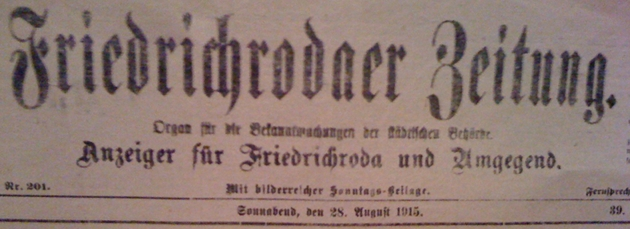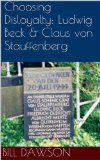My first post at German History Buzz appeared on 3 August 2009. As I think back on the site’s first month, a few things come to mind…
This is fun
I finally have the outlet that I have wanted for my deep interest in Austrian and German history. I finally have a reason for pulling the old books off the shelves, thumbing through them, making notes, organizing my thoughts and writing about them. I’m not just doing it for fun now; I’m sharing with whomever comes by and has a look. Whether it’s just one visitor or one thousand, someone out there — someday — will probably stumble across what I’ve said and perhaps even make some use of it. That’s more fun than sitting around reading and thinking, “Hmm, this is interesting,” and then doing nothing with the information.
This is difficult
Fun though it is, it is often also difficult to write a blog post. Thinking of something and typing it are the two easiest steps. The hard part comes when…
- … I want to include material from other sources. This typically requires research either on- or offline. When offline, it means moving my head back and forth from the source material, be it a book, newspaper, or what have you. When online, this might mean a lot of switching back and forth between browser windows, copying and pasting, etc.
- … I want to include one or more photos/images. I’ve chosen a WordPress template that really demands images, as you’ve no doubt noticed. I like the look of it, but it sure does require effort. First I need to find an image; and not just any image, since I will only take one that I may legally use. After finding a legal image, I need to crop and resize it to fit the correct dimensions for the template I’m using. That means saving the image locally, firing up image editing software if it’s not already running, cropping and resizing, re-saving the altered image, uploading it to the blog and copying its URL so I can refer to it.
It may not sound like a lot, but the time spent on these tasks seems to add up quickly.
This requires discipline
As the last section described, the creation of a single blog entry can actually be fairly difficult. Well it’s even more challenging when you want to do it several times per week! This requires discipline. My discipline, like that of others, goes up and down. This is no doubt reflected on the site!
I or We?
If you have read a lot here, you may have noticed my inconsistent use of the first person singular and plural. I started off with a lot of “we”, entertaining the idea that some day one or more other people might contribute to the site. Therefore I thought maybe “we” was appropriate. But, in fact, I noticed I felt uncomfortable every time I typed it. So I’ve stopped. New material contains only the first person singular unless there is a particular reason for the plural.
Traffic is hard to get
At the one month point, I get less than 20 visits per day to the site. I’m not surprised about that, given the niche quality of the topic and the fact that a blog absolutely needs inbound links from other web sites in order to even have a chance to get a respectable Google page rank. At the moment, just one external site links to me, and Google doesn’t even seem to have noticed it. So it could take a long, long time before I ever — if ever — get traffic to the site. But that’s fine, because just the act of writing about history is fun for me. So I’m going to stick with it no matter what. Of course, more visitors could help with the issue of discipline which I talked about above; a healthy readership certainly provides some motivation. But either way, this site shall remain alive with fresh content coming out on a fairly regular basis.





